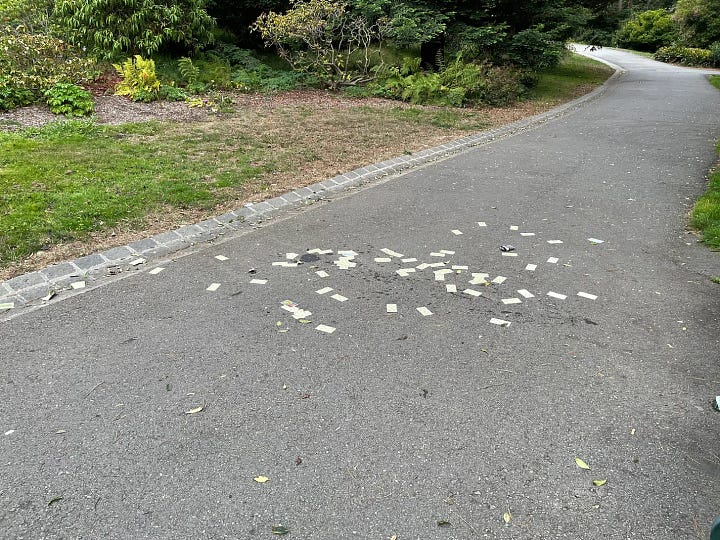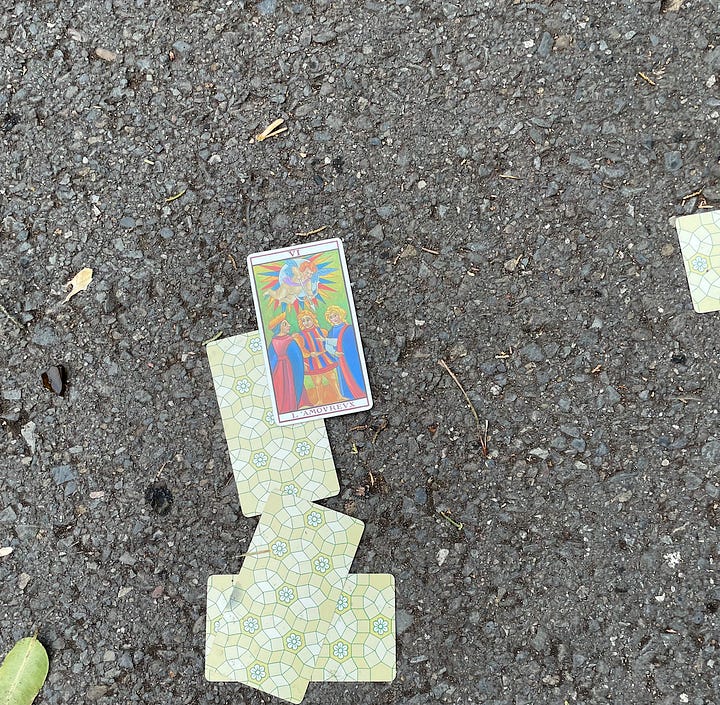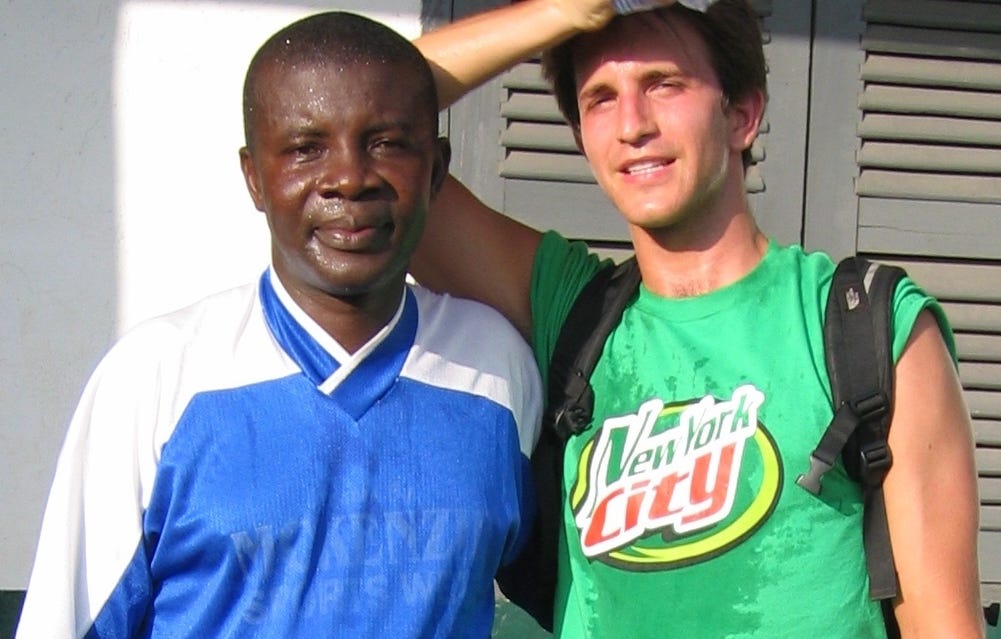
I’m in a long-distance relationship. When I first met her, I was just starting a one-year appointment as a visiting scholar in San Francisco. (My favorite job title so far, except perhaps for Peace Corps volunteer.)
I wrote a note to myself: “She makes my heart swim.” I told my friend who I was staying with at the time, “She’s an amalgam.” We both wear our merino wool sweaters sans undershirt sometimes. The recurring image of us that I have is that of a seashell in two halves, the patterns on each half distinctive but contiguous with the other.
To ease her mind about dating an out-of-towner, I told her, “I’m not wedded to Baltimore,” on the first or second date. I was too late to stop the word from coming out of my mouth, and her eyes flashed in what way I wasn’t sure. Months later, she would tell me that weeks before we met, she was standing on the Spanish Steps in Rome and had a premonition I was the man she’d marry. (We had been chatting on the apps by then.)
Two weeks after we met, I told her I loved her. It was twilight at Ocean Beach. The Anchor Steam beer helped keep the August chill at bay but wasn’t speaking for me. She said, “Thank you,” and we went off for warm noodles like we’d planned. Outside the restaurant, she continued: “Sorry. I dropped the egg.” And she explained her metaphor of couples tossing an egg between one another. (Life’s weightiest things are the most fragile.) She extended the metaphor: the best place to toss an egg is in bed, so it doesn’t break if one of us drops it. We’ve had all our hardest conversations in bed ever since.
A few weeks later, I was walking through Golden Gate Park on my way to her apartment. A deck of tarots was strewn across the path, three of the cards face up. As it happens, one of my doctor friends is also a tarot card reader. I sent her pictures and she texted back in minutes: “You literally drew the Lovers card and the Ace of Wands, which is generally a card of impending success in all readings.”


Our first date had been dinner at Ebisu in the Inner Sunset. (We now celebrate our “sushiversary” every July.) I was transfixed by her. The coincidences, synchronicities, and similarities came in a flurry. We’d both done undercover work as research interns, and spent significant amounts of time in Africa and Asia. Years ago in Manhattan, I’d met and exchanged emails with her favorite Stanford professor at a dinner party. Her favorite writer, Peter Hessler, was someone I once sought advice from.
Best known for River Town, about his time in China with the Peace Corps, Peter had written a New Yorker profile of my friend, a retired lawyer turned Great Wall scholar (I think it’s his favorite job title so far). My friend introduced me to Peter in Beijing, where we were all living at the time, and I asked him how he’d made up his mind to join the Peace Corps. He said, “I was raised Catholic. It was either Peace Corps or the military.” I wasn’t inspired, but I wasn’t dissuaded, either.
Some time after, I left Beijing for Accra to be sworn in as a Peace Corps volunteer. A Ghanaian government motorcade escorted our school bus from the airport to a university on the outskirts of the city where we would spend the first few days of pre-service training. We quickly learned to refrain from using our left hands, and calibrated our English so that we understood what it meant “to be invited” (“eat some”), “to flash” (“to call up”), and “to be aware” (if your clothing is too revealing).
I’d always had an interest in languages, something else my fiancée and I share. I was eager to learn Twi. Like Chinese, it is a tonal language. Like all languages, it is uniquely poetic.
But my Peace Corps service was cut short. I was medically evacuated less than six months in. After a week of doctor’s appointments in Washington, D.C., I was medically discharged, and deflated. Gone were what were supposed to be among the best two years of my life.
Nearly a decade and a half later, I would almost lose another two years of my life.
The first time I had long Covid, I didn’t know enough about it to attribute it to the odd ways my body and mind were failing. Eighteen months later, I was back to my usual mental and physical shape. I moved to San Francisco for a year, and met Christina.
Our first sushiversary almost didn’t happen. I’d caught Covid again, and my test was positive for thirteen days, turning negative only on the day of.
When the brain fog, tremors, and leaden legs came a couple of weeks later, I knew what it was this time. I thought I could wait it out, power through it, or will it away. But nine days turned to nine weeks, and Christina finally convinced me to see a doctor. The off-label medication she prescribed was a small miracle, returning some of my clarity.
Nine weeks have turned to sixteen months. I’m not cured, but I’ve healed.
My other half has kept our relationship-egg intact. Those months are a strange swirl of time to me. She has to remind me sometimes of things I’ve forgotten, and things we’d both rather not remember. There are things, like the way her eyes flashed that first July, or poems I’d once memorized, that are clearer in my mind than anything since my long Covid. Like this old favorite, by e.e. cummings:
maggie and milly and molly and may
went down to the beach(to play one day)
and maggie discovered a shell that sang
so sweetly she couldn't remember her troubles,and
milly befriended a stranded star
whose rays five languid fingers were;
and molly was chased by a horrible thing
which raced sideways while blowing bubbles:and
may came home with a smooth round stone
as small as a world and as large as alone.
For whatever we lose(like a you or a me)
it’s always ourselves we find in the sea
Every word I need to talk about the last sixteen months is in there. Except one.
We can find ourselves, and still miss ourselves.
I don’t mean a sorrowful missing. Not a longing for something lost, nor a need to recover the thing we miss. But the kind of missing that’s like a faint musical harmony that weaves beneath the melody that remains. A trace or fragment in your vision that colors everything you see.
Before I left Ghana, I did get the chance to learn some Twi. To say I miss you is to say, “You are in my eyes.”






